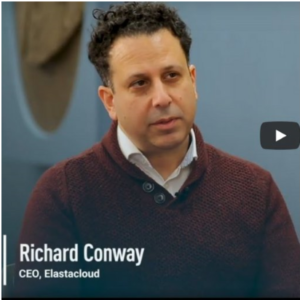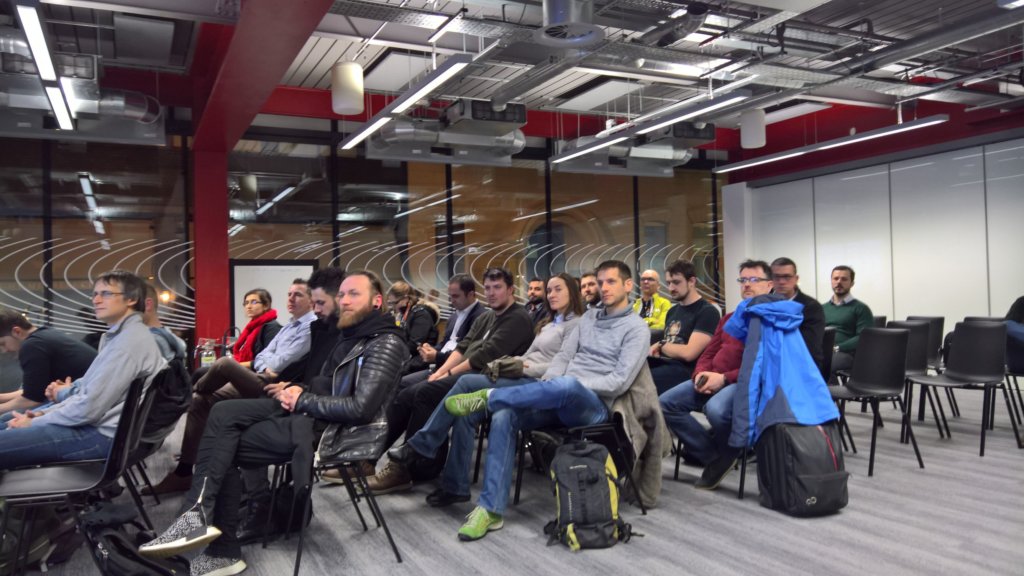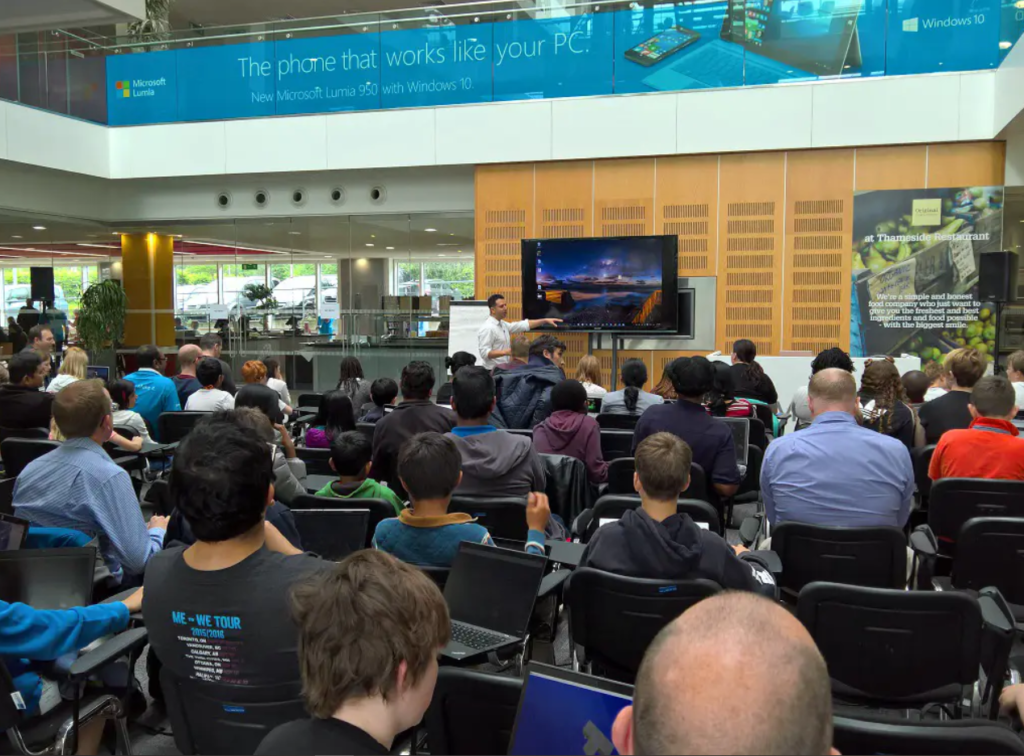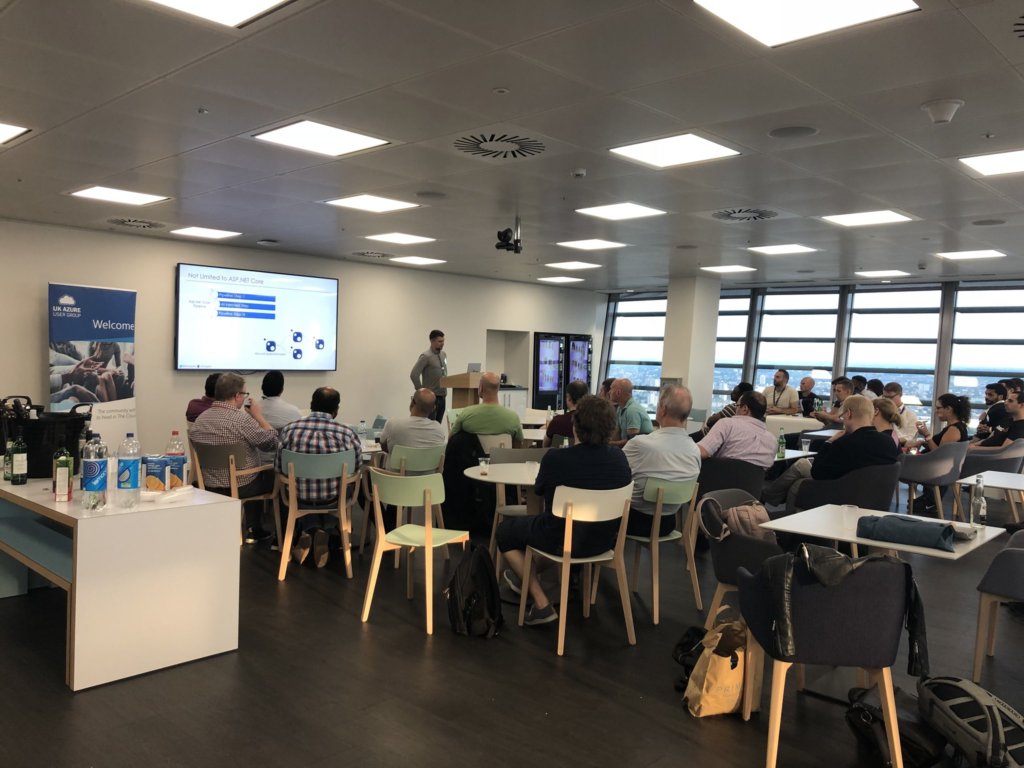A warm welcome to Richard Conway, Microsoft Regional Director, Azure MVP, Founder of the UK Azure User Group and strong supporter of Code Club UK as he joins us for ‘Voices of the Azure Community’.
We hope you enjoy this insight into the work Richard carries out to support the Azure Community.
Please tell us about your own role with Elastacloud.
I’m the CEO of Elastacloud which is a cloud and data consultancy with several gold partnerships. My day to day is varied. I do a lot of management and working closely with our customers but also technical architecture, hands on development for a variety of data products including Data Explorer and Databricks. It’s hard growing a consultancy in the right way but as we have had tech communities at the heart of our company it’s been fun to see the next generation of MVPs and community leads grow from our ranks.
You founded the UK Azure Users Group, as well as the UK Cloud Infrastructure User Group – would you tell us how these groups came about?
The UK Azure Users Group I created with my co-founder of Elastacloud, Andy Cross. We were both early users when there were only a couple of people in Microsoft UK knew what Azure was. We had some early strong support from Microsoft and a recruitment consultancy (Hancock and Parsons) that backed the group financially. It was a great start and we generated a great deal of new content getting our membership up to thousands of people. We’ve had great support from people like Scott Guthrie, Mark Russinovich and others over the years, that have always given their time to speak to our audiences. The UK Cloud Infrastructure Users Group was an initial collaboration with MVP Martynas Valkunas (Magic Marty), who was born out Elastacloud ranks. Whilst @ukazure is a developer group this is a group of ITpros and DevOps professionals (the lines are blurred now between professions now but it was founded at a time when Microsoft was pushing the role of ITPro in Azure)
Could you outline what your work with these groups entails and how you have seen the UK Azure community grow over the years?
Running a community is hard. You perpetually need to innovate over content and ensure that you know your audience. Few people actually want to do the work in the community but someone has to find and source venues, raise money, market events and get the right people there. It’s worth it in the end though as it’s a great educator generally. The more relevant content the better the greater the growth in the group. We now host monthly meeting, sometime twice monthly. Our mantra is that we get 4 Microsoft speakers per year, 4 community speakers and 4 customers. Microsoft speakers generally give us rich content about new Azure products, community speakers about open source initiatives, pet projects and other things and customers about implementations in the real world. It makes a nice balance.
You also work closely with Code Club in the UK. Would you let us know about the Work that Code Club carry out and the benefits you see from it?
My son is 14 and has been engaged in coding since he was 7. It’s been a pleasure to see him develop and becoming adapt at games programming and Python over the years. It spurred me to learn new things and teach them back to my local code club in Ilford and then later create AzureCraft. AzureCraft was initially sponsored by Microsoft and the first event in 2016 was a fantastic success with a program of education around all things Raspberry Pi, Microbit and Minecraft with close to 600 people each day with the second day held at the Microsoft Campus in Reading. AzureCraft has had some fantastic successes with the last few done around AI in Minecraft and Javascript Games programming for the web. Kids are incredible at the speed with which they grok things. Unlike most of us adults they’re less worried about the path and more about the end result which leads to fantastically quick innovations. Code club does a fantastic job nationwide and I’ve seen many underprivileged kids gain confidence through our Saturday morning workshops. It’s a privilege to be part of teaching the next generation of software engineers like this.
With such a varied workload could you describe what your working week entails?
My weeks and days vary considerably but generally I start at around 7.30. These days, whilst working from home I try and get up as early as possible and start the day with a run (knee pains permitting!) My day starts at 8.30 with a series of standups and various meetings throughout the day. It’s a rare privilege to get anymore than 3 hours of focus time in an 8 hour day. The day normally ends with a catch-up with my senior team to understand what’s been going on in the day and to plan.
Customers come first but I always try and make time for all my staff. These days I’ve been working late into the evenings for a couple of things, firstly I’m committing to more open source this year so have a couple of new projects and secondly as all of Elastacloud are taking Microsoft certifications I’m doing the same so doing exam study where I can. I’ve been switching off with my team once every couple of weeks and now we have a D&D online game going. It’s a great way to build team building! Friday’s are generally sacred for me and I try and make it completely over to me and my staff so entails a lot of catchups and demos of things in flight including internal projects. We also have an All Hands meeting which takes place across all the offices we have which is great.
Would you outline what you find to be the most challenging and the most rewarding aspects of your role?
Challenging is keeping customers happy. They have different expectations of what’s possible and by when. It’s especially difficult when we’re in cloud compete scenarios. As a company that’s all Microsoft we generally have to face staff in our customers that don’t know the capabilities of Azure but do of other clouds and keep on comparing them to us. Some of the information is kept biased.
I think there’s a couple of things that have been incredibly rewarding to me over the years. The first is getting things into production. Getting software into a release cadence and BAU (ops) state is a fantastic feeling. Secondly, I would say seeing our staff mature into the incredible developers and community advocates that they are. We run a program called CloudGrads where we take uni grads and put them through Microsoft certification, agile training and software delivery on customer projects. Seeing this in action with uni grads and interns and the odd one becoming a Microsoft Student Partner, speaking at Build and other things has been fantastic. I was nowhere near the capability of the younger generation when I was their age!
To date what has been your proudest accomplishment?
I think the first conference that we did on a shoe-string budget was our proudest accomplishment. It was in summer 2012 which was a turning point in Azure with the advent of persistent virtual machines and web apps. We had Scott Guthrie and the evangelist team come over and speak for us. There were huge challenges on the day caused by the venue which meant that we lost internet access for a few hours but the incredible team that supported Scott Guthrie managed to pull off an incredible conference. It was probably my proudest moment because we were the first in the UK to do a conference of that size (1100+ people).
In your opinion what is the most exciting thing about working with Azure?
Difficult question to answer. I would say that there is something new always around the corner so an amazing new service to change the way that you do things. The other and most obvious is that it levels the playing field it enables the smallest businesses to innovate at the same rate or faster than the largest. We’ve seen the first of these through the Challenger Banks in finance which are process stricken and use the power and scale of the cloud to outcompete traditional banks (e.g. ClearBank, an early adopter of Azure)
What is your favorite Azure Product and why?
During my day I mainly use Azure Data Factory, Data Explorer and Databricks BUT my favourite product is Azure Stream Analytics. It’s incredibly versatile for lambda architectures and you get the best bang for your buck of any service (Microsoft if you’re listening don’t put the price up!)
What in your opinion has been the biggest advance in Azure in the past 18 months?
Another hard question. I would say Azure Arc. Whilst it doesn’t directly affect my day to day I feel that Microsoft have struggled with pure hybrid PaaS. In the early days they tried to sell large container instance of Azure, then Azure Pack, many incarnations of Azure Stack but I think there’s always a gap. To me Azure Arc, still in its infancy will plug this gap so that worrying about point of presence will be a thing of the past.
Have you had or do you have a mentor?
I wish I had. I had a lot of support, however, from some great people in Microsoft UK over the years who helped shaped me and my company. Few of the early people like Steve Plank, who really helped bring me out of my shell by allowing me to proctor and teach on early Azure camps that Microsoft created. As a result I’ve pushed my own staff and where I could have acted as mentors to them.
How did you become an Azure MVP?
It was really in recognition for @ukazure and the conferences. It’s a great honour to be part of this community.
Do you have suggestions for other community members who hope to become MVP’s?
Keep doing what you love. MVP or no MVP I’ll be running my communities for as long as I can. It’s important to do what you love and some people are naturally made thought-leaders. Keep contributing to open source, speaking at events, writing blog posts or running a user group. Do these things because you love them. If you’re not getting recognised by Microsoft and want to be then contact an MVP you know or someone in Microsoft and get them to sponsor you through the process. It’s hard to get in and to stay in but the rewards of being part of an incredible global community like this is worth the wait. If you don’t get selected first time, keep trying. I have an amazing MVP lead, Claire Smyth, who has brought the program together in the UK and continues to make it an amazing program where a diverse set of individuals share knowledge and ideas. I think I’ve been incredibly lucky.
Could you describe what the unique spirit of the Microsoft Community means to you?
The unique spirit of the Microsoft community is the developer. I was a few years in my job when .NET was released in beta (~1999). It was an amazing path of growth for myself and many others. Techies love to share knowledge and for me this was my foray into community and sharing of ideas as a participant. It took me another decade to found my own community. For me the spirit of the Microsoft Community is driven by the people in Microsoft. People like Scott Guthrie, Mark Russinovich, Scott Hanselman etc. are real and show that the techie spirit is at heart of Microsoft. Whilst Microsoft is a large multinational community is at heart. In the early days we worked with Developer Platform Enablement (DPE) that then become DX (Developer eXperience) and now we’re working with CSAs and others who work over and above to educate communities and blog and tweet about all of the amazing things they are doing both in work and in their spare time.




